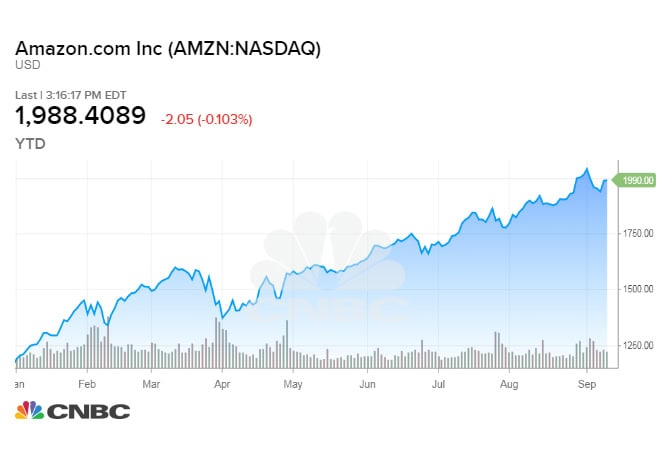
Jeff Bezos is better known for building the e-commerce empire of Amazon than his entrepreneurial work at rocket-builder Blue Origin — but Morgan Stanley says that may change.
“We believe investors may want to pay far more attention to another emerging force for the advancement of efforts in Space that has both the will and, increasingly, the financial muscle to put to work. That force is Jeff Bezos,” Morgan Stanley analyst Adam Jonas said in a note Thursday. “Investors may want to take notice.”
Bezos pours about $1 billion of his Amazon stock into his space venture each year, with Blue Origin expected to begin competing directly with Elon Musk’s SpaceX in 2020. Morgan Stanley estimated Bezos’ Amazon shares are worth about $160 billion — in other words, “equal to around 16 years worth of NASA expenditures on Space exploration,” the firm said. Morgan Stanley advised its clients to take note of that comparison as Bezos’ wealth continues to grow.
“As the value of Jeff Bezos’s Amazon stake approaches $200 billion, his ability to influence private, commercial, and even government efforts in space grows, potentially accelerating capabilities and capital formation,” Jonas said.
Amazon shares briefly passed $1 trillion in market cap for the first time on Sept. 4, joining Apple as the only publicly traded U.S. company above the benchmark. Analysts cite the company’s ever-diversifying portfolio as a value driver.
Bezos has said publicly that Blue Origin is “the most important work” he’s doing, Morgan Stanley noted. He also has said there should be “a permanent human settlement on one of the poles of the moon” and thinks it’s not just time for humans to return to the moon, it’s “time to stay.”
Blue Origin is headed quickly toward commercial operations as the company nears the end of testing for several of its major projects. Its BE-4 engine, the thunderous staple of Blue Origin’s propulsion business, has demonstrated that it “works, and works well,” CEO Bob Smith told CNBC in April. The company also hopes to soon launch humans into space on its New Shepard rocket, which has flown nine times. New Shepard is being built to offer tourists a ride to space, bringing passengers in a capsule up past 350,000 feet, where they would spend about 10 minutes floating in zero gravity before returning back to Earth.
In light of Bezos’ vision for Blue Origin and the future of the space industry, Morgan Stanley believes “investors cannot be too early in at least understanding this rapidly evolving topic,” Jonas said.
“A number of events in recent weeks have the potential to accelerate the investment significance of the space economy from what is mostly in the private equity domain to the public equity domain,” a team of Morgan Stanley analysts said in a note on Aug. 23. “We want to stay ahead of the curve during this critical time of capital formation.”
Space remains in focus at Morgan Stanley, as it tracks over 100 growing companies. Morgan Stanley sees that economy growing to more than $1.1 trillion by 2040, driven by the need for a space-based telecommunications network as wireless data usage increases. The vast majority of private space investment has come as the government has reeled in its spending in recent years.

